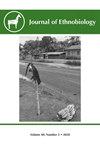Differential Use of Game Species in an Amazonian Indigenous Community: Navigating Economics, Subsistence, and Social Norms
IF 2.9
3区 社会学
Q1 ANTHROPOLOGY
引用次数: 2
Abstract
Abstract. Hunting is a key subsistence strategy and source of income and food security for rural communities throughout the world. Hunters often gift game meat to their friends or family in return for reciprocation or other social benefits. We used interviews to assess how hunters in an Amazonian Indigenous community navigate the economic, subsistence, and social aspects of hunting. We found that hunters typically sell the most valuable and preferred species whole, except for the head, gift better cuts of less-preferred species, and consume the lowest quality portions of non-preferred species. We conclude that hunters use species and portions of carcasses differentially to maximize profit and food security and fit the social norms of the community. Understanding the social systems surrounding wild game use in rural Amazonian communities provides insight into how the loss of wild mammals could influence food security and social relationships.亚马逊土著社区中狩猎物种的差异利用:导航经济、生存和社会规范
摘要狩猎是一项重要的生存战略,也是世界各地农村社区的收入和粮食安全来源。猎人经常把猎物肉送给他们的朋友或家人,以换取回报或其他社会福利。我们使用访谈来评估亚马逊土著社区的猎人如何应对狩猎的经济、生存和社会方面。我们发现,猎人通常会出售除头部外的最有价值和最受欢迎的整个物种,对不太受欢迎的物种进行更好的切割,并消耗非受欢迎物种中质量最低的部分。我们得出的结论是,猎人不同地使用尸体的种类和部分,以最大限度地提高利润和粮食安全,并符合社区的社会规范。了解亚马逊农村社区野生动物使用的社会系统,可以深入了解野生哺乳动物的消失如何影响粮食安全和社会关系。
本文章由计算机程序翻译,如有差异,请以英文原文为准。
求助全文
约1分钟内获得全文
求助全文
来源期刊

Journal of Ethnobiology
Social Sciences-Anthropology
CiteScore
4.80
自引率
3.40%
发文量
21
审稿时长
>12 weeks
期刊介绍:
JoE’s readership is as wide and diverse as ethnobiology itself, with readers spanning from both the natural and social sciences. Not surprisingly, a glance at the papers published in the Journal reveals the depth and breadth of topics, extending from studies in archaeology and the origins of agriculture, to folk classification systems, to food composition, plants, birds, mammals, fungi and everything in between.
Research areas published in JoE include but are not limited to neo- and paleo-ethnobiology, zooarchaeology, ethnobotany, ethnozoology, ethnopharmacology, ethnoecology, linguistic ethnobiology, human paleoecology, and many other related fields of study within anthropology and biology, such as taxonomy, conservation biology, ethnography, political ecology, and cognitive and cultural anthropology.
JoE does not limit itself to a single perspective, approach or discipline, but seeks to represent the full spectrum and wide diversity of the field of ethnobiology, including cognitive, symbolic, linguistic, ecological, and economic aspects of human interactions with our living world. Articles that significantly advance ethnobiological theory and/or methodology are particularly welcome, as well as studies bridging across disciplines and knowledge systems. JoE does not publish uncontextualized data such as species lists; appropriate submissions must elaborate on the ethnobiological context of findings.
 求助内容:
求助内容: 应助结果提醒方式:
应助结果提醒方式:


